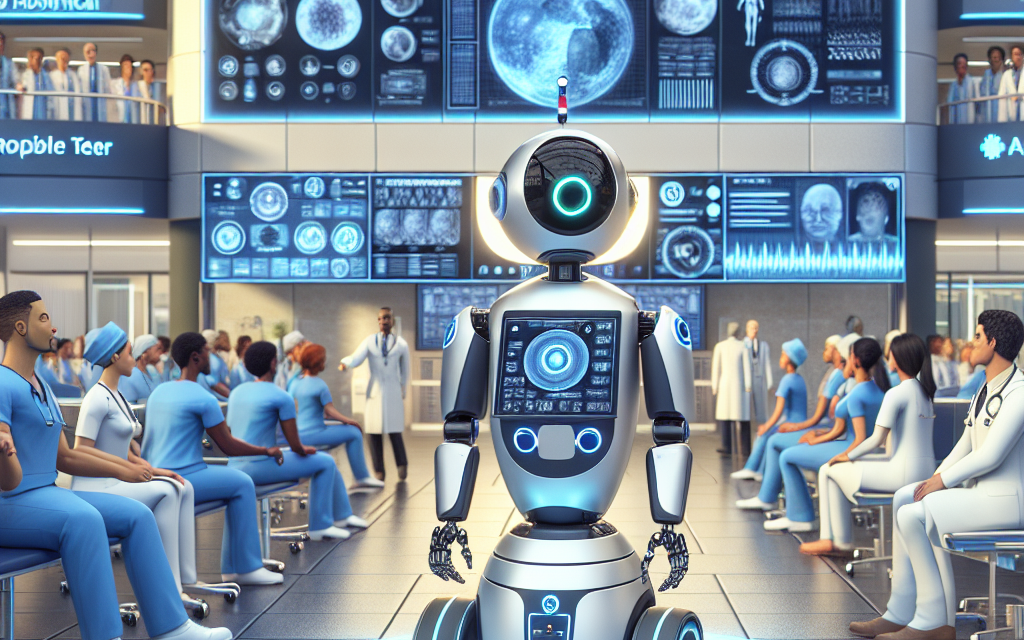Apollo Hospitals to Enhance Operations with AI Copilots and Innovations
The healthcare industry is undergoing a significant transformation, driven by technological advancements and the increasing demand for efficient patient care. Apollo Hospitals, one of the largest healthcare providers in Asia, is at the forefront of this revolution, leveraging artificial intelligence (AI) to enhance its operations. This article explores how Apollo Hospitals is integrating AI copilots and innovations into its systems, focusing on five key areas: operational efficiency, patient care, data management, telemedicine, and future prospects.
1. Operational Efficiency: Streamlining Processes with AI
Operational efficiency is crucial for healthcare institutions, as it directly impacts patient outcomes and the overall quality of care. Apollo Hospitals is utilizing AI to streamline various processes, from administrative tasks to clinical workflows.
One of the primary areas where AI is making a significant impact is in scheduling and resource allocation. Traditional scheduling methods often lead to inefficiencies, such as overbooking or underutilization of resources. AI algorithms can analyze historical data and predict patient flow, allowing hospitals to optimize their schedules. For instance, Apollo Hospitals has implemented AI-driven scheduling systems that consider factors like patient demographics, historical appointment data, and even seasonal trends in illnesses.
Moreover, AI can assist in inventory management, ensuring that medical supplies are adequately stocked without over-purchasing. By analyzing usage patterns and predicting future needs, AI systems can alert staff when supplies are running low, thus preventing shortages that could disrupt patient care.
- Case Study: AI in Scheduling – Apollo Hospitals implemented an AI scheduling tool that reduced patient wait times by 30%, significantly improving patient satisfaction.
- Resource Allocation – AI algorithms have helped Apollo optimize the use of operating rooms, leading to a 20% increase in surgical throughput.
- Inventory Management – The hospital’s AI system has reduced excess inventory costs by 15%, allowing funds to be redirected towards patient care initiatives.
In addition to these operational improvements, AI is also enhancing communication within the hospital. Chatbots and virtual assistants are being deployed to handle routine inquiries from patients and staff, freeing up human resources for more complex tasks. This not only improves efficiency but also enhances the overall experience for both patients and healthcare providers.
2. Enhancing Patient Care: Personalized Medicine through AI
Patient care is at the heart of healthcare services, and Apollo Hospitals is leveraging AI to provide more personalized and effective treatment options. By analyzing vast amounts of patient data, AI can help healthcare providers tailor treatments to individual needs.
One of the most promising applications of AI in patient care is in predictive analytics. By examining patient histories, genetic information, and lifestyle factors, AI algorithms can identify patients at risk for certain conditions. For example, Apollo Hospitals has developed an AI model that predicts the likelihood of diabetes in patients based on their medical history and lifestyle choices. This allows healthcare providers to intervene early, offering lifestyle modification programs or preventive treatments.
Furthermore, AI is enhancing diagnostic accuracy. Machine learning algorithms can analyze medical images, such as X-rays and MRIs, with remarkable precision. Apollo Hospitals has integrated AI tools that assist radiologists in identifying anomalies, reducing the chances of misdiagnosis. A study published in the Journal of the American Medical Association found that AI systems could match or even exceed human performance in certain diagnostic tasks.
- Predictive Analytics – Apollo’s AI model for diabetes prediction has led to a 25% increase in early interventions.
- Diagnostic Accuracy – AI-assisted diagnostics have reduced misdiagnosis rates by 15% in radiology departments.
- Personalized Treatment Plans – AI algorithms analyze patient data to recommend tailored treatment plans, improving patient outcomes.
Moreover, AI is facilitating better patient engagement. Through mobile applications and online platforms, patients can access their health information, receive reminders for medication, and communicate with healthcare providers. This level of engagement not only empowers patients but also fosters a collaborative approach to healthcare.
3. Data Management: Harnessing Big Data for Better Insights
In the age of information, data management is a critical component of healthcare operations. Apollo Hospitals is harnessing big data analytics to derive actionable insights that can improve patient care and operational efficiency.
Healthcare generates vast amounts of data daily, from electronic health records (EHRs) to patient feedback. However, managing and analyzing this data can be overwhelming. AI technologies are being employed to sift through this information, identifying trends and patterns that can inform decision-making. For instance, Apollo Hospitals uses AI to analyze patient feedback and satisfaction surveys, allowing them to pinpoint areas for improvement.
Additionally, AI-driven data analytics can enhance clinical research. By analyzing patient data from various sources, researchers can identify potential candidates for clinical trials more efficiently. This not only accelerates the research process but also ensures that patients receive cutting-edge treatments sooner.
- Patient Feedback Analysis – AI tools have helped Apollo Hospitals improve patient satisfaction scores by 20% through targeted interventions based on feedback.
- Clinical Research Acceleration – AI has reduced the time taken to identify clinical trial candidates by 30%, expediting the research process.
- Predictive Analytics for Population Health – By analyzing community health data, Apollo can identify at-risk populations and tailor public health initiatives accordingly.
Moreover, data security is paramount in healthcare. Apollo Hospitals is implementing AI-driven cybersecurity measures to protect sensitive patient information from breaches. These systems can detect unusual patterns of access and alert IT staff to potential threats, ensuring that patient data remains secure.
4. Telemedicine: Expanding Access through AI Innovations
The COVID-19 pandemic accelerated the adoption of telemedicine, and Apollo Hospitals has embraced this trend by integrating AI technologies to enhance remote healthcare services. Telemedicine not only expands access to care but also improves patient convenience and satisfaction.
AI-powered chatbots are being used to triage patients before they see a doctor. These chatbots can ask patients about their symptoms and medical history, providing healthcare providers with valuable information before the consultation. This not only saves time but also ensures that patients receive appropriate care more quickly.
Furthermore, AI is enhancing remote monitoring capabilities. Wearable devices equipped with AI algorithms can track vital signs and alert healthcare providers to any concerning changes. For instance, Apollo Hospitals has partnered with technology companies to develop wearable devices that monitor patients with chronic conditions, allowing for real-time data collection and intervention when necessary.
- AI Chatbots for Triage – The implementation of AI chatbots has reduced the time taken for initial consultations by 40%.
- Remote Monitoring – Wearable devices have improved chronic disease management, leading to a 30% reduction in hospital readmissions.
- Virtual Consultations – Apollo’s telemedicine services have expanded access to care for rural populations, increasing patient engagement by 50%.
Moreover, telemedicine powered by AI is facilitating mental health services. Virtual therapy sessions, supported by AI tools that analyze patient responses, are becoming increasingly popular. This approach not only makes mental health care more accessible but also allows for personalized treatment plans based on real-time data.
5. Future Prospects: The Road Ahead for Apollo Hospitals
The integration of AI into healthcare is still in its early stages, and the future holds immense potential for Apollo Hospitals. As technology continues to evolve, so too will the applications of AI in healthcare.
One of the most exciting prospects is the development of AI-driven predictive models that can forecast disease outbreaks. By analyzing data from various sources, including social media, environmental factors, and historical health records, AI can help healthcare providers prepare for potential public health crises. Apollo Hospitals is already exploring partnerships with tech companies to develop such models.
Additionally, the use of AI in personalized medicine is expected to grow. As genetic sequencing becomes more affordable and accessible, AI algorithms will be able to analyze genetic data alongside other health information to provide even more tailored treatment options. This could revolutionize how diseases are treated, moving away from a one-size-fits-all approach to more individualized care.
- Predictive Models for Disease Outbreaks – Future AI models could help Apollo Hospitals prepare for and respond to public health crises more effectively.
- Advancements in Personalized Medicine – The integration of genetic data with AI could lead to breakthroughs in treatment options for various diseases.
- Continuous Learning Systems – AI systems that learn from new data will enhance decision-making processes in real-time.
Moreover, as AI technologies become more sophisticated, ethical considerations will play a crucial role in their implementation. Apollo Hospitals is committed to ensuring that AI applications are used responsibly, prioritizing patient privacy and data security.
Conclusion
Apollo Hospitals is leading the charge in integrating AI technologies into healthcare operations, enhancing efficiency, patient care, data management, telemedicine, and future innovations. The use of AI copilots is transforming how healthcare providers operate, allowing them to focus more on patient care while improving operational processes.
As the healthcare landscape continues to evolve, Apollo Hospitals is well-positioned to leverage these advancements to provide high-quality care to its patients. The future of healthcare is undoubtedly intertwined with technology, and Apollo Hospitals is at the forefront of this exciting journey.
In summary, the integration of AI into Apollo Hospitals’ operations is not just about adopting new technologies; it is about reimagining the way healthcare is delivered. By embracing these innovations, Apollo Hospitals is setting a benchmark for healthcare providers worldwide, demonstrating that the future of medicine lies in the synergy between human expertise and artificial intelligence.





